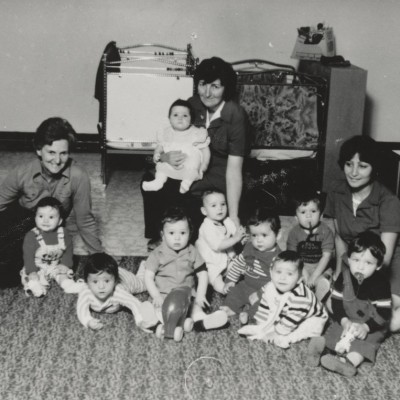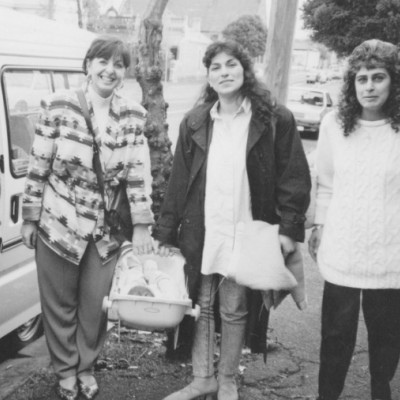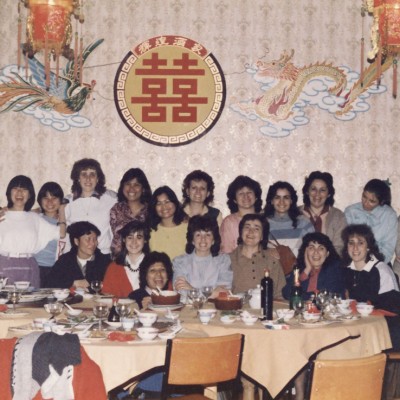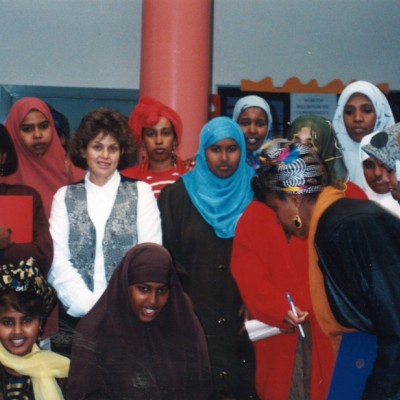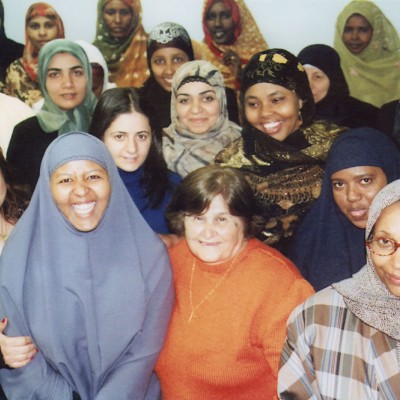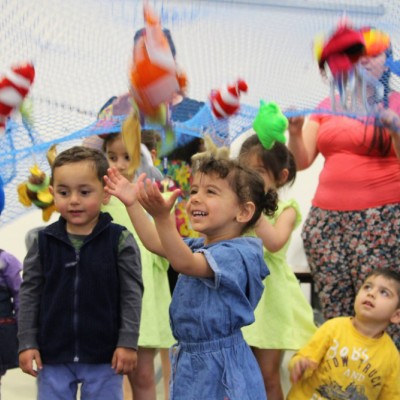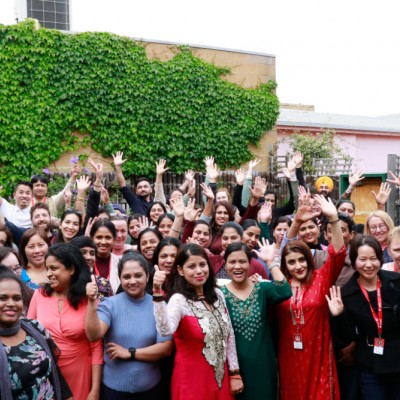Changing needs
By the 1990s the shift in government policy from ethno-specific to multicultural children’s services was being felt within VICSEG. Bureaucracies were no longer interested in developing separate services specifically for individual sections of the community and it became impossible for organisations like VICSEG to develop these separate, parallel services. The organisation – having spent the last decade focusing on research, advocacy, resourcing and establishing ethnic childcare centres, with a lesser focus on training initiatives – took time adjusting to this change.
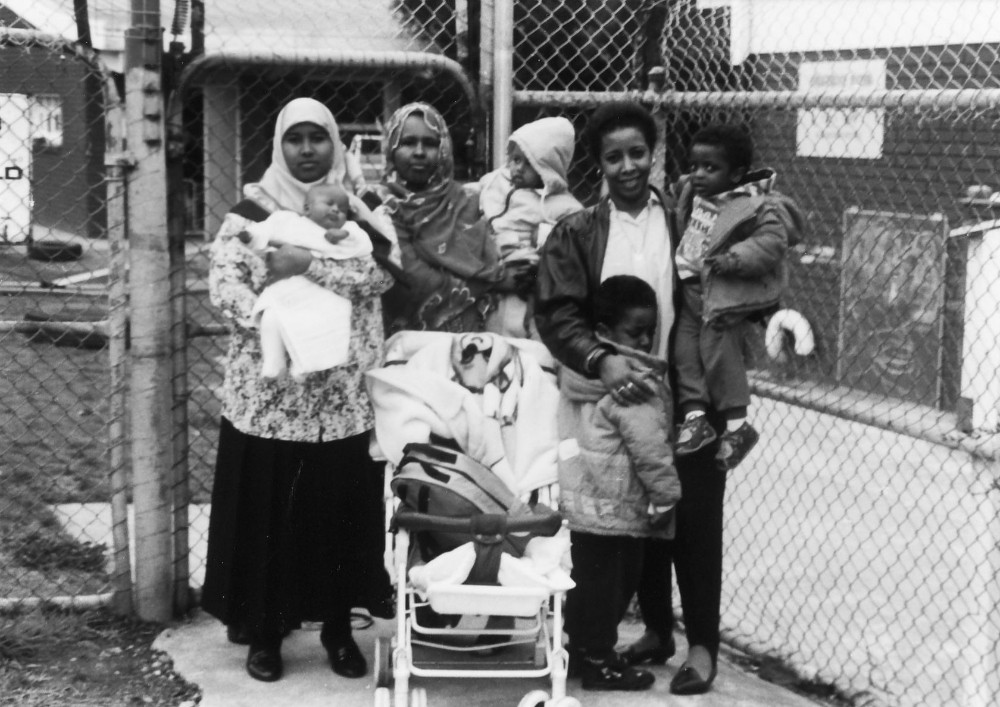
Ethnic Children’s Services Worker Samia Baho (right) building connections with families from the Horn of Africa.
Courtesy Gabrielle Fakhri
The organisation was growing and migrant communities in Victoria were changing. Whereas in the early days, Lebanese, Yugoslav and Filipino communities were a large focus for the organisation, by the mid-1990s there were increasing numbers of refugees arriving from mainland China, as well as from war-torn areas like Afghanistan, the Horn of Africa, Bosnia-Herzegovina and Iraq, that were in desperate need of assistance in accessing services. Along with the changing government policy, the organisation needed to address these developments.
Towards the end of 1994, the organisation was faced with its own internal challenges. The relationship between the Co-ordinator and the Management Committee became strained as expectations around the roles of each became blurred. This was not the first time staff had clashed with the Management Committee and issues of conflict had arisen. By September 1994, however, tensions between the Co-ordinator Arlene D’Mello and the Management Committee had reached breaking point and Arlene resigned that same month.
Gabrielle Fakhri was asked to step in as Acting Co-ordinator, which she did with reluctance, given her passion for her role as an Ethnic Children’s Services Worker and for working directly with ethnic communities. In April 1995 John Zika was appointed Executive Director of VICSEG, a role which was created to replace the of Co-ordinator.
John came to VICSEG at a time when the organisation was in turmoil. The departure of the former Co-ordinator Arlene D’Mello had left many of the staff distressed and upset. The roles of the staff and the Management Committee were in disarray and the organisation was struggling to catch up with changing government policies and the waves of migration that brought new communities to Melbourne with their own unique issues and challenges.
Working with a large bureaucracy initially in education, and then in a smaller bureaucracy, local government, I understood some of the tensions around ethno-specific services and mainstream services.
I found the whole opportunity to actually work directly with a range of ethnic communities – and to have workers who came from those communities working together – incredibly attractive. It was like a new phase in my life that … presented whole lot of new opportunities and ways of doing things.John Zika, Executive Director, 1995-2018
The organisation was also operating in unfavourable workplace conditions. The Nicholson Street office was an old Victorian shopfront, with half partitioned spaces, which meant training courses were happening in the same space, while staff were also trying to work.
In addition to the less than ideal office environment, tensions between the remaining staff and the Management Committee were still high when John took up the post of Executive Director. Most noticeable was the issue of control and who was actually running the organisation.
I didn’t know that it was a tumultuous time. I only found that out once I’d accepted the job … When I started, I called the first meeting of the Committee of Management, I could pick up what some of the tensions in the place were … The distinction between governance and the executive role was very badly understood. There was this sense that if you were on the Management Committee well then, you were in control and in day-to-day control. I realised very, very early on that I had to change that.
John Zika, Executive Director, 1995-2018
Change and strong leadership were needed. In November 1995, just a few months after John stepped into the role of Executive Director, VICSEG held a review day in order to assess how the organisation was progressing and where it was headed. As a result, the disharmony between some of the Management Committee and staff was assessed and recommendations made for the clear definition of staff and committee roles, along with suggestions for better communication.
As well as structural changes to the organisation, VICSEG needed to re-evaluate where and how it could most effectively help migrant communities while also remaining in line with the government funding. The previous focus on advocacy and report writing, which had been so effective early on, was no longer the ideal method of operation. Moreover, the communities most in need had shifted with new waves of migration now coming from the Horn of Africa. VICSEG was not only understaffed but it was also lacking staff members connected to these new migrant communities.
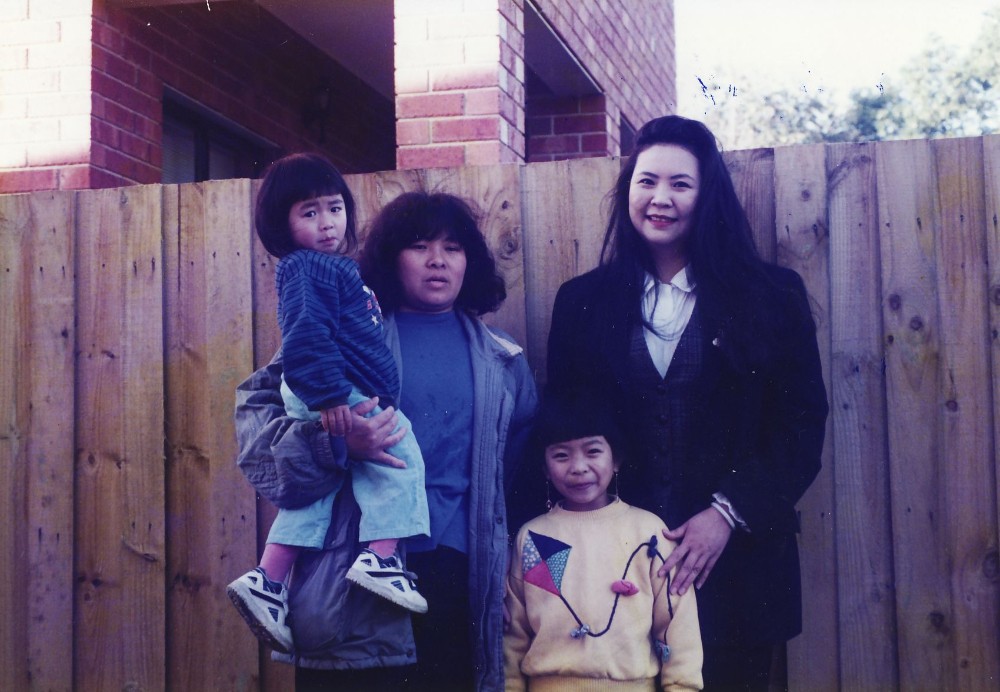
Ethnic Children’s Services Worker May Ho with a family that was assisted by VICSEG, c. 1994.
In the second half of 1995, VICSEG was able to employ three bilingual trainees through the Department of Education, Employment and Training (DEET) Jobskills Program. These trainees came from Hmong, Somali and mainland Chinese backgrounds and offered VICSEG the opportunity to engage more closely with these growing communities.
We had to make far better use of the people that we had. We needed to focus a lot more on employing people who came from communities that had recently migrated to Australia, and then utilising these people to actually engage with families and build the bridges to services. Connecting in with the service providers around what their cultural issues where, what their values were, and how they understood things, and how they approached child rearing, and so forth. I remember that as an awareness that really grew quite strong in my thinking about the future of where the organisation was headed.
John Zika, Executive Director, 1995-2018
By 1996, the dust stirred up from the stress and change of the early 1990s had just about settled and VICSEG began consolidating its focus on working with those communities most recently arrived and most in need of support. In addition, VICSEG’s successful submission for funding under the federal government’s Working Nation scheme meant that by 1996 the organisation found itself with the opportunity to expand its training initiatives through the New Work Opportunities Project. As a result, VICSEG was able to focus on training, providing ethnic communities – and migrant women in particular – with the skills and expertise to work in childcare. Together with VICSEG’s renewed leadership and direction, it was the beginning of an exciting new chapter in the co-operative’s history.
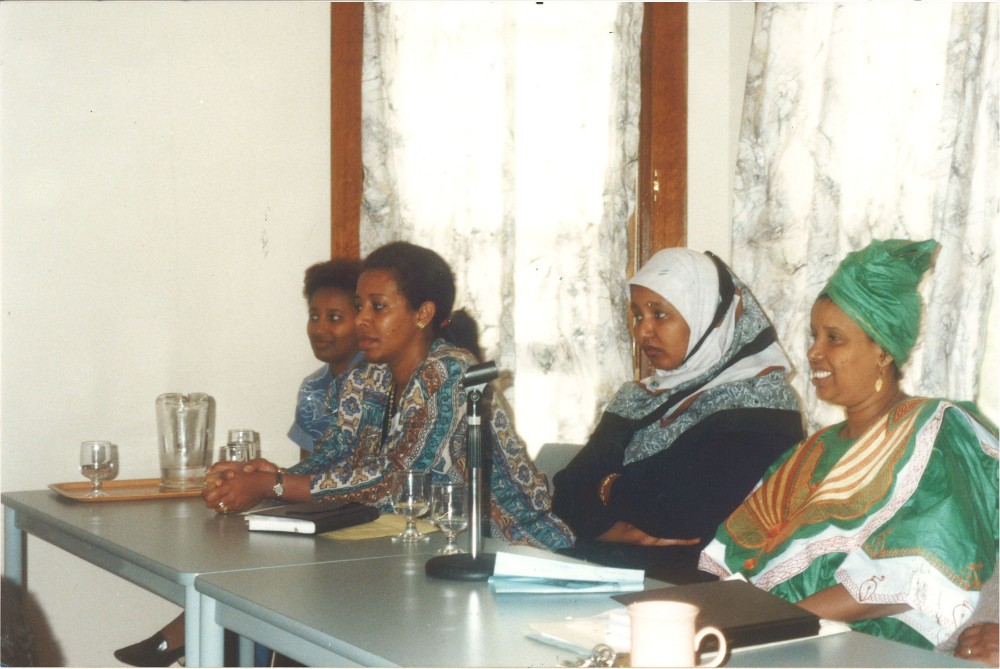
Panel of women from the Horn of Africa at a community forum.
Resources:
Interview with John Zika, 9 June 2011.
Interview with John Zika, 1 September 2022.
Michele Haywood, ‘Report to VICSEG Management Committee: recommendations for action arising from the review day’, 1995.
VICSEG Annual Report, 1995.
